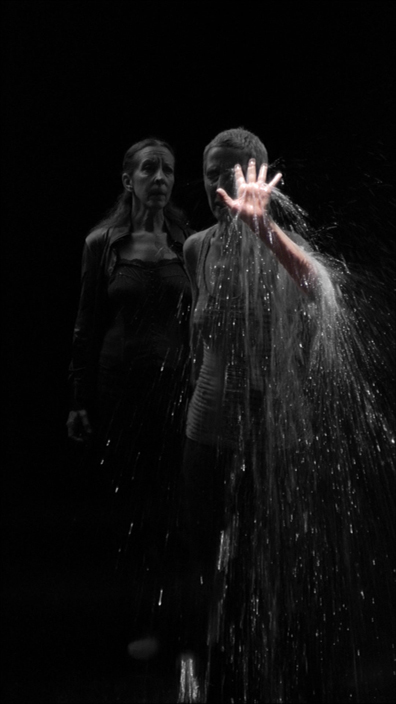Saturday, 7 July 2012
Bill Viola and Spirituality 3
Do we know what we mean by spirituality? Does being spiritual mean we pay less attention to our material circumstances than we might otherwise? But then what is it we pay attention to? I know that various religious practices have their own views on this. We can meditate and de-clutter our minds, and this can be beneficial. I return to Tim Parks's Teach Us To Sit Still, his sceptic's account of how meditation saved him from severe physical pain. He has continued to meditate since.
Does that make Tim spiritual? Is that what spirituality is, a kind of triumph of mind over body, or perhaps just the opposite, body over mind?
I don't think that is what is meant by spirituality in Bill Viola's case. There is something rather more mystical and transcendental in his work, though that quality is - very importantly - linked with an implication that mysticism is not only a democratic human condition (his people are not in fancy dress, their clothes are generally simple, modern, and anonymous), but the natural one. It's possible to think of Viola as a mystic street-trader: the spirit's populist.
And even so, I wonder a little. Are those people in the films really ordinary? Is there not something reminiscent of earlier religious figures, those received ideas of what spirituality is, about them? And if they do correspond to received ideas does that weaken their claim to genuine spirituality, however we might define that in this case? They might be perfectly genuine. The might just happen to correspond to contemporary versions of archetype: the ascetic, the wild man, the merciful mother and so forth.
Here I am splashing about in the shallows of the deep. If only the deep didn't try so hard to convince me of its depth!
*
Seeing more Violas doesn't necessarily help his case. The other drenchings and drownings are visually captivating but the process is known. There are subtle differences between them of course, as witness the titles. Some deliberately imitate the forms of Early Renaissance paintings, others are more like Caravaggio or Rembrandt. They are all visually pleasing to look at.
It is the visually pleasing aspect that slightly raises the hackles. If only it were like this! If only our post-Christian minds could slip into that grand mode of speech without an actual God that demanded anything more of us than a permanently blissed-out oblivion. If only that blissed-out oblivion did not come at us with all the force of a sophisticated theatrical evangelism!
Post-Christian? Residual Christian? Agnostic but spiritual? Atheist but spiritual?
Why do Rembrandt, Fra Angelico and Piero della Francesca - to use a few stray examples - move me? Move me unconditionally, that is. I recognise the meanings of religion in their rhetoric and know I am facing something essential. Why do shadows of scepticism linger when I look at Bill Viola? Perhaps there'll be a Blues Brothers moment when James Brown asks: Have you seen the light? And like Jake. E. Blues I will respond: Yes, yes, Jesus H Tapdancing Christ... I have seen the light! It's right there! And it's being filmed by Bill Viola!
Subscribe to:
Post Comments (Atom)


No comments:
Post a Comment